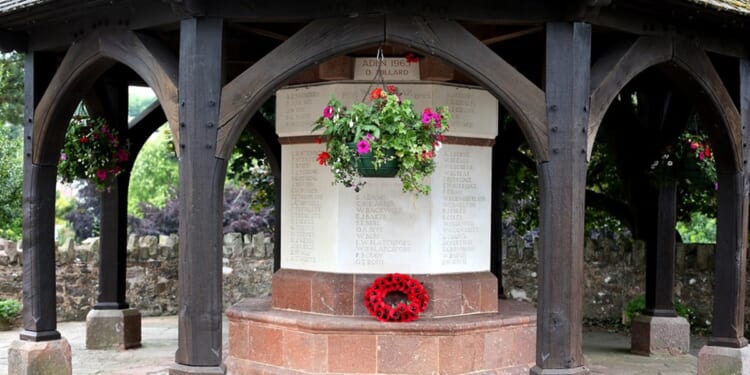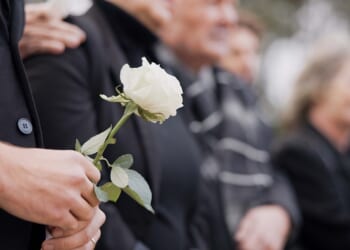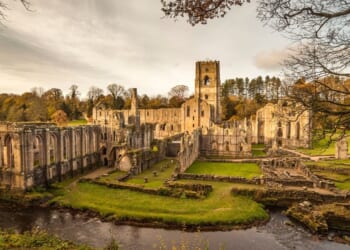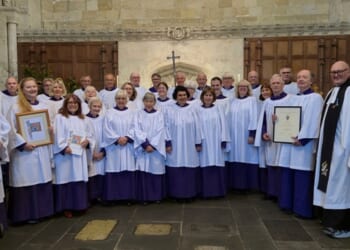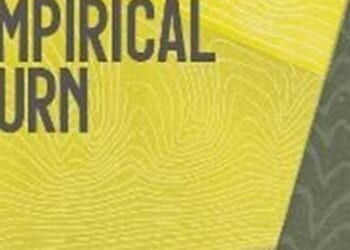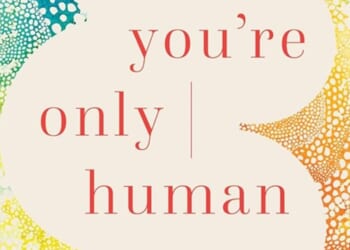JUST across the street from where I lived for the first seven years of my life in a flat above the engineering works established by my grandfather, there is a splendid and unusual war memorial. The memorial was created at the same time as Grandpa was setting up his business, in the early 1920s; but little could he or his wife have imagined that, just 25 years later, more stone tablets would be added to the memorial, and the family name would be inscribed not only above the engineering works (by now, a motor engineering works), but also on the memorial.
Their second son, Arthur “John” Dalton Cherry, was killed in August 1944, when the Avro Lancaster bomber on which he was a flight engineer was lost in action. He was 19 years old at the time.
My grandparents continued to live in that same small town until they died in the 1970s. Dominating their sitting room was a photograph of John in his uniform, with another of him with his colleagues in front of their Lancaster; and his medals were in a small display case. One day, my grandmother told me that she was still waiting for the day when there would be a knock on the door, and John would be home at last. They say you shouldn’t teach your grandmother to suck eggs; so I didn’t say, “Come on, Grandma. You know that’s not going to happen.” I kept silent; but I did start to wonder why she thought that way. Now, 50 years later, I think I understand.
MY GRANDPARENTS married in March 1917. Grandpa was a merchant seaman who did a brief conversion course to equip him to move from Merchant to Royal Navy. He was deployed on HMS Stonecrop, a decoy, or Q-ship. It was a heavy, slow, coal transporter, flying a Merchant Navy standard, but armed with concealed guns and torpedoes. Like all Q-ships, its task was to attract the attention of U-boats, lure them into thinking that the ship was harmless, so that they would draw close, and then sink it with deck guns, avoiding the expensive use of a torpedo.
Q-ships sailed aimlessly around the shipping lanes, seeking to attract the attention of the enemy. When a U-boat came near, half the ship’s crew abandoned ship, while those who remained manned the guns and the engine rooms, and, when the captain judged that the U-boat was at its most vulnerable, opened fire.
ON 16 September 1917, Stonecrop sank a U-boat. The next day, it was itself torpedoed. Several men were killed instantly, and the ship slowly sank. Some of the survivors crammed into a couple of lifeboats, but the 26 others — including my grandfather — had nothing more than an unseaworthy raft, with three gallons of water and one tin of biscuits between them. Over the first day, they did what they could to improve the raft, using bits of wreckage that were floating around. On the second, the high seas turfed them all out. They lost everything except one of their water bottles.
By this time, the lifeboats had got to safety, and a search for the raft had begun, but it was abandoned because of the high seas. The missing seamen were given up as lost, and their relatives were informed. I can imagine my grandmother’s despair, receiving this news just six months after their marriage.
The raft drifted helplessly before the men were eventually rescued, six days after the sinking. More than half the men on the raft had died, some crazed by drinking sea-water and throwing themselves into the ocean. The survivors were so dehydrated, weak, and traumatised that not only could they not walk or look after themselves, but they were all unable to speak.
I don’t know anything about when my grandparents were reunited, or how long it took my grandfather to recover physically and mentally from the experience. I am, however, confident that he was never the same person again.
MY GRANDPARENTS’ second son was killed in the Second World War, but they had an older son who was also in the RAF and was also shot down. He survived, though the injuries to his foot were not treated while he remained a prisoner of war. When he returned home after the war, he still had a bullet in his foot and was profoundly malnourished.
The suffering of the shipwrecked father, the death of the second son, and the injury and imprisonment and subsequent lifelong disability of the eldest son — what must this have been like for Grandma? All those days, nights, weeks, and months of uncertainty. All the rumours and stories of what the war experience was like. All the worries about her new husband, or her sons. The almost complete lack of agency or power with regard to any aspect of what was going on.
The question what to do with all this, day in and day out, must have borne on her very heavily. She had a daughter who, after the war years, remained single, because the men whom she might have wanted to marry never came back. After the war, she was a great carer of Grandma, but during the war she was herself in a place of danger and trauma as a nurse on hospital ships in the Mediterranean. That, too, is service and sacrifice.
GRANDPA was at home during the Second World War, running the local fire service as well as his motor engineering works. And, in the background of all this, the youngest son — my father — was soaking up the toxins, terrors, and traumas of war at second hand, while being subjected to that “It’s all right for you” gaze.
It is right that we wear poppies for remembrance; and it is right that the names of those who made the ultimate sacrifice are recorded and read out; and it is right to remember all the civilians who lost their lives. But, as we do that, we should perhaps allow ourselves to read between the lines of our war memorials — to see through the names, and to remember that the suffering and sacrifice of war is not limited to those lists.
The price of war is paid not only by Henry V’s band of brothers — that “happy few” — but also by their mothers, sisters, and fiancées, and by all those whose young lives have been wounded, scarred, and pulled out of shape by war.
The Revd Dr Stephen Cherry is Dean of King’s College, Cambridge.

